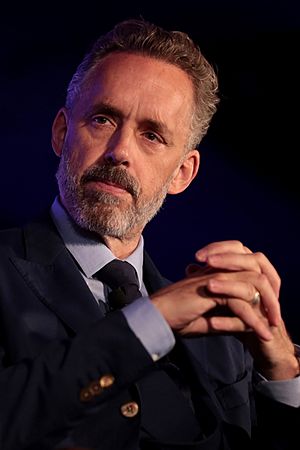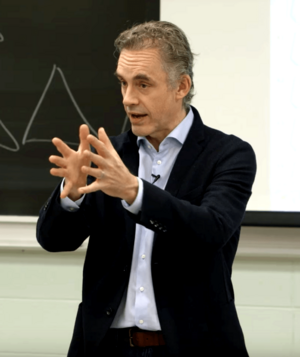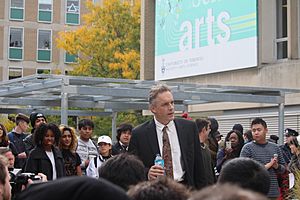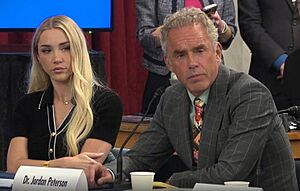Jordan Peterson facts for kids
Quick facts for kids
Jordan Peterson
|
|
|---|---|

Peterson in 2018
|
|
| Born |
Jordan Bernt Peterson
12 June 1962 Edmonton, Alberta, Canada
|
| Education | University of Alberta (BA, BA) McGill University (PhD) |
| Occupation | |
|
Notable work
|
|
| Spouse(s) |
Tammy Roberts
(m. 1989) |
| Children | 2 |
| Relatives | Jim Keller (brother-in-law) |
| Scientific career | |
| Institutions |
|
| Thesis | Potential Psychological Markers for the Predisposition to ... (1990) |
| Doctoral advisor | Robert O. Pihl |
| Influences |
|
| Influenced | Gregg Hurwitz |
| Signature | |
 |
|
Jordan Bernt Peterson (born 12 June 1962) is a Canadian psychologist, author, and online personality. He became widely known in the late 2010s for sharing his ideas on culture and society. Peterson describes himself as a "classical liberal" and a "traditionalist."
He was born and grew up in Alberta, Canada. He earned two bachelor's degrees from the University of Alberta. Later, he received his PhD in clinical psychology from McGill University. After teaching at Harvard University, he returned to Canada in 1998. He became a psychology professor at the University of Toronto. In 1999, he published his first book, Maps of Meaning: The Architecture of Belief. This book explored how people create meaning and belief systems.
In 2016, Peterson gained attention for videos where he discussed a Canadian law, Bill C-16. He argued about the use of certain gender pronouns. This discussion led to a lot of media coverage. In 2018, he released his second book, 12 Rules for Life: An Antidote to Chaos, which became a bestseller. He published his third book, Beyond Order: 12 More Rules for Life, in 2021. He also left the University of Toronto that year. In 2022, Peterson became the chancellor of Ralston College. His lectures and talks are very popular online, with millions of views.
Contents
Early Life and Education
Jordan Peterson was born on June 12, 1962, in Edmonton, Alberta. He grew up in a small town called Fairview. He was the oldest of three children. His mother, Beverley, was a librarian, and his father, Walter, was a school teacher. His middle name, Bernt, comes from his Norwegian great-grandfather. Peterson grew up in a family that was mildly Christian.
In junior high, Peterson became friends with Rachel Notley. She later became a political leader in Alberta. From ages 13 to 18, Peterson was part of the New Democratic Party (NDP). As a teenager, he thought religion was not for smart people. He also hoped for big changes in society. This hope changed when he met other activists in college. As a young man, he worried a lot about the Cold War. He also thought about the chance of a nuclear war.
Career Highlights

From 1993 to 1998, Peterson taught and researched at Harvard University. A former student, author Gregg Hurwitz, said Peterson inspired him. Another psychologist, Shelley Carson, noted that Peterson's lectures were very popular. In 1998, Peterson returned to Canada. He became a full professor at the University of Toronto.
Peterson's interests include many areas of psychology. These include the psychology of religion and personality psychology. For much of his career, he also worked as a clinical psychologist. He saw about 20 patients each week. In 2016, he started releasing videos where he discussed Bill C-16. He paused his clinical practice and teaching in 2017 and 2018 to focus on new projects.
In 2021, Peterson retired from the University of Toronto. He became a professor emeritus. In May 2022, he became chancellor of Ralston College. This is a new liberal arts college. In June 2023, he co-founded the Alliance for Responsible Citizenship. He hosted its first international conference in October 2023.
Books and Ideas
In 1999, Peterson published his first book, Maps of Meaning: The Architecture of Belief. In this book, he explains his ideas about how people create meaning. He also discusses how they form beliefs and stories. Peterson wanted to understand why people and groups get into conflicts. He explored the reasons behind people's strong beliefs.
In January 2018, Peterson's second book came out. It was called 12 Rules for Life: An Antidote to Chaos. This book shares self-help ideas in an easier-to-understand way. It became a bestseller in many countries.
His third book, Beyond Order: 12 More Rules for Life, was released in March 2021. Peterson's fourth book, We Who Wrestle with God: Perceptions of the Divine, was published in November 2024.
His Views
Peterson describes himself as a classical liberal and a traditionalist. He has said that people often mistake him for being right-wing. He supports ideas like universal healthcare and helping the poor.
Academia and Society
Peterson believes that universities have played a big role in what he calls "political correctness" in North America and Europe. He thinks that some areas of study, especially in the humanities, have become less focused on science. He argues that "proper culture" and Western civilization are being challenged.
Peterson's discussions on these topics have become very popular online. Many people, including journalists, have noted his influence.
Identity and Groups
Peterson has spoken against what he calls "identity politics." He believes that people should focus on their individual lives. He thinks they should take responsibility for their own actions. He argues that focusing too much on group identity can be dangerous.
He has also discussed how censorship can make people dishonest. He believes that when people are afraid to speak freely, they might start saying things they know are not true.
Gender and Expression
Peterson has talked about a "crisis of masculinity." He believes that the "masculine spirit is under attack." He argues that society often sees existing power structures as an "oppressive patriarchy." However, he suggests that these structures might be based on people's abilities. He has also said that men without partners might become violent. He believes that male violence is lower in societies where people tend to have one partner.
In a 2018 interview, Peterson discussed the gender pay gap. He claimed that differences in personality between men and women explain some of the pay differences.
Bill C-16 Discussion
In September 2016, Peterson released videos discussing Bill C-16. This Canadian law aimed to protect people based on "gender identity or expression." Peterson said he would not use certain preferred gender pronouns if he felt it was "compelled speech." He argued this could affect free speech.
Many people, including transgender rights groups, disagreed with Peterson's interpretation of the law. They said he was misrepresenting it. Despite this, Peterson's views gained a lot of attention. In May 2017, he spoke against Bill C-16 at a Canadian Senate Committee hearing.
In November 2017, a teaching assistant at Wilfrid Laurier University, Lindsay Shepherd, was criticized for showing a clip of Peterson discussing Bill C-16 in class. The university later apologized for how it handled the situation.
Climate Change Views
Peterson has expressed doubts about the scientific consensus on climate change. He has been identified by some climate scientists as someone who helps delay action on climate change. His videos discussing climate change have been viewed millions of times.
In a 2022 interview, Peterson said that "there is no such thing as climate." He also questioned the accuracy of climate modelling. Climate scientists have criticized his statements. They say his arguments show a lack of understanding of how science works.
In November 2023, the Alliance for Responsible Citizenship, which Peterson is part of, held a conference. Peterson stated at the conference that "We do not believe that humanity is necessarily and inevitably teetering on the brink of apocalyptic disaster." The conference featured speakers who downplayed the effects of human-caused climate change.
Religion and Belief
In a 2017 interview, Peterson was asked if he was a Christian. He replied, "I suppose the most straight-forward answer to that is yes." When asked if he believes in God, he said, "I think the proper response to that is no, but I'm afraid he might exist." He has also described God as the "ultimate fictional character."
Peterson draws inspiration from the ideas of Carl Jung about religion. He also shares views similar to Christian existentialism. He respects Taoism because it sees nature as a balance between order and chaos. He believes life would be meaningless without this balance. He also admires some teachings of the Eastern Orthodox Church.
Peterson explored his religious views further in his 2024 book, We Who Wrestle with God.
Influence and Public Appearances
In 2018, Kelefa Sanneh of The New Yorker called Peterson "one of the most influential—and polarizing—public intellectuals." Mick Brown of The Daily Telegraph described him as a very visible figure in the "culture wars." Peterson is especially popular among young men. Many believe he offers a different perspective on modern issues.
Peterson has appeared on television since 2003. He discussed psychological topics on shows like Big Ideas and The Agenda. He has also been featured in documentaries such as No Safe Spaces and What Is a Woman?.
He has participated in several public debates. In June 2018, he debated Sam Harris about religion and God. In April 2019, he debated Slavoj Žižek about happiness under different economic systems.
Personal Life
Since around 2000, Peterson has collected Soviet-era paintings. In 2016, he became an honorary member of the Charles Joseph family. Charles Joseph is a Kwakwakaʼwakw artist. Peterson was given the name Alestalagie, meaning "Great Seeker."
Family Life
Peterson married Tammy Roberts in 1989. They have a daughter, Mikhaila, and a son, Julian. Mikhaila is also a political commentator and podcaster.
Images for kids
See also
 In Spanish: Jordan Peterson para niños
In Spanish: Jordan Peterson para niños
 | Madam C. J. Walker |
 | Janet Emerson Bashen |
 | Annie Turnbo Malone |
 | Maggie L. Walker |




